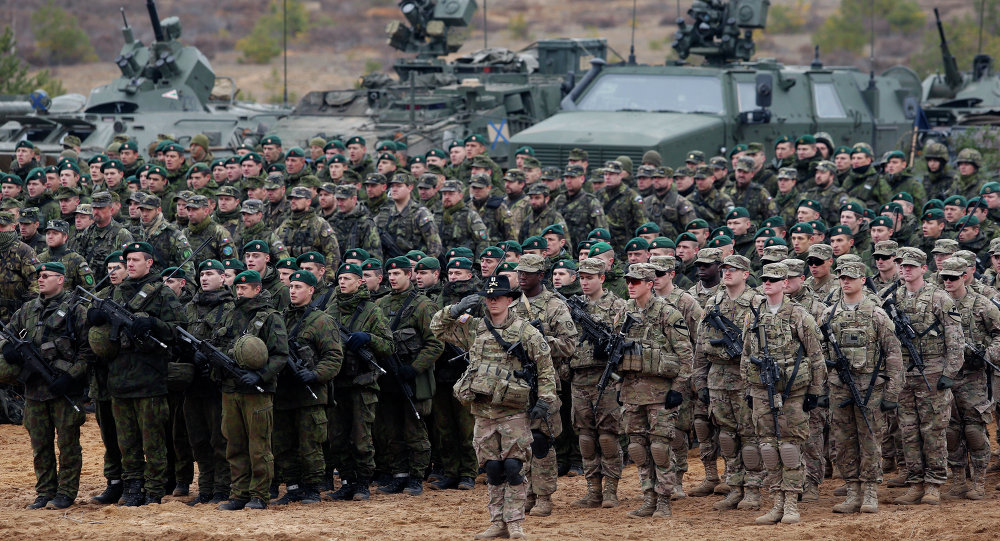Sourced : Eurobserver
By Andrew Rettman
The US and Germany have unequivocally said that Nato will not build new bases in Poland, citing tactical and political reasons.
“Nato’s not talking about establishing bases … we support an enhanced presence, but we can do it without bases, bases, bases,” James Townsend, a senior Pentagon official, said in Bratislava on Friday (15 April).
His comment came at the Globsec conference in the Slovak capital after Poland’s foreign minister, Witold Waszczykowski, said he wanted “presence, presence, presence and once again presence” of Nato troops to act as a “symbol of readiness to defend the eastern flank.”
Speaking also at Globsec earlier on Friday, German defence minister Ursula von der Leyen said Nato deterrence of Russia “is not a question of permanent bases, it’s a question of smart movement.”
She said that Nato’s new rapid reaction force is enough to ensure that “Russia should not even think about trying” to destabilise Poland or one of the Baltic states.
The Polish appeal comes ahead of a Nato summit in Warsaw in July.
Nato defence ministers in February already decided in favour of “continuous rotational” presence instead of new bases.
But Waszczykowski in Bratislava asked for more.
“We expect decisions that change the security status of this region. Although we belong to the same institution [Nato] there are different statuses – a better one in the west and a different one on the so-called eastern flank. There are no troops deployed here permanently, no military facilities owned by Nato,” he said.
“We expect the Nato summit to change the situation.”
The Nato rapid reaction force is to include about 4,000 U.S troops that will “rotate” in and out of the Baltic region – deploy in different areas in temporary facilities for a few months at a time.
It will include warehouses full of US tanks near Russia’s borders that can be quickly deployed.
The Warsaw summit will also discuss giving Nato commanders the flexibility to react to hostile acts without first holding political talks in Brussels, Townsend said.
It will send the message that Nato is ready to use its nuclear deterrent if need be in reaction to Russia’s nuclear sabre-rattling, he added.
Modern warfare
Petr Pavl, a Czech general who is in charge of Nato military planning, said new bases might act as a “political deterrent” but have little value in tactical terms.
“Modern warfare is not about static lines and huge banks of steel … it’s about mobility and the ability to project power in different areas and at different levels,” he said.
“To build a permanent new base … you’re just adding one item to your adversary’s target list.”
Townsend dismissed Russia’s claim that there was a post-Cold War deal for Nato to stay away from its neighbourhood.
“There was never a promise made to them that I know of on the shape of Nato forces other than the Nato-Russia founding act,” he said.
The 1997 treaty commits Nato to avoid “additional permanent stationing of substantial combat forces” close to Russia, but only “in the current … security environment.”
Germany’s Von der Leyen said that Russia unilaterally “left” the treaty when it invaded Ukraine.
Political effort
But she said that Nato should “stick to our commitments” in order to keep the moral high ground.
Pavl also said that Nato was making a “political effort not to escalate” the situation.
“We’re keeping a very low profile. Our [rapid reaction] force is not there to threaten … We’re not trying to bring a significant military force to the [Russian] border.”
Von der Leyen said that Germany was “ready for dialogue” with Russia but only if Russia was willing to respect international law.
She said its invasion of Ukraine was a “bitter awakening” for Germany. “Russia is not our enemy, but it’s no longer our partner,” she said.
She defended the West’s decision not to give Ukraine military support “because we would have had a bloody war on Ukraine’s soil.”
“The most vulnerable part of Russia is its economy … so we answered by targeting their most vulnerable point to make them understand,” she said, referring to EU economic sanctions on Russia.
Ian Brzezinski, a former Pentagon official who now works for the Atlantic Council, a think tank in Washington, told EUobserver that Von der Leyen’s words would be “demoralising” for Ukraine, which has lost over 9,000 people in the war.
Provocation
He predicted that Russia will stage a military provocation ahead of the Warsaw summit.
Unarmed Russian jets simulated attacks on a US warship, the USS Donald Cook, in the Baltic Sea over a three-day period earlier this week, the Pentagon’s Townsend said.
“We were in international waters, where you’d expect safe passage, not to be buzzed constantly,” he said. “We do not buzz Russian ships,” he added.
Nato’s Pavl said: “I don’t believe that, in the current circumstances, Russia will try to destabilise the [Nato] summit.”
“They’re trying to be more open and to enter into a dialogue, so any bigger provocation wouldn’t suit that purpose.”
Nato and Russia will next week hold the first meeting of a joint Council since the Ukraine war.
Alexander Vershbow, the Nato deputy head, said in Bratislava that Nato will urge Russia to avoid military manouevres that could cause an “accidental conflict.”
“It’s [the Coucil meeting] not meant in any way to signal a normalisation of relations with Russia,” he said.

